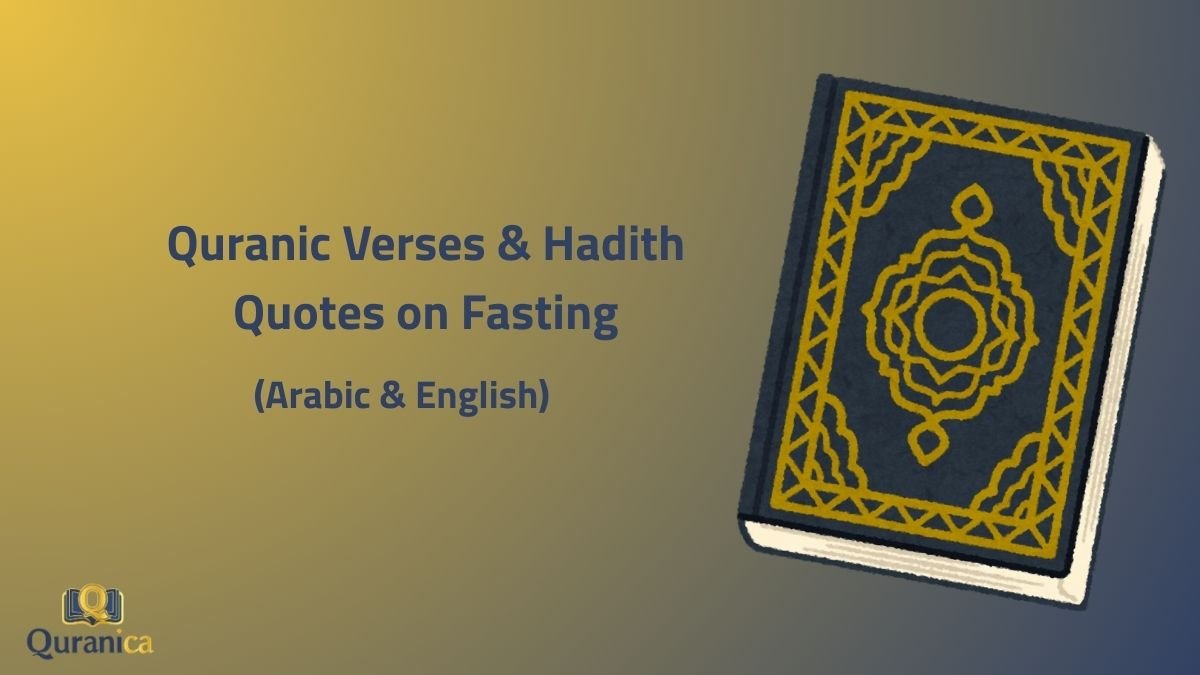Quranic Verses and Hadith on Fasting are not just reminders—they are the ultimate spiritual weapon for discipline, taqwa, and life-changing transformation. If you’re a non-Arabic speaking Muslim in the US, UK, Canada, Australia, Norway, or the UAE, this guide will give you the clearest Quran and Sunnah proofs on fasting with meanings that hit deep and revive your faith.
👉 Want to understand fasting beyond translations?
Enroll now in Quranica’s structured Quran & Islamic studies courses for non-Arabic speakers and learn step by step with authentic explanations, guided lessons, and real-life application. Start today—your Ramadan (and your life) should never be the same again.
This act of devotion, abstaining from food, drink, and other worldly desires for Allah’s sake, is mentioned numerous times in the Glorious Quran. When we speak of fasting, Sawm (صَوْم), the root S-W-M (ص-و-م) itself appears around 14 times.
Let’s reflect together on some Quranic verses and hadith on fasting.
1. The Main Quranic Verse on the Obligation of Fasting in Ramadan
Allah Subhanahu wa Ta’ala introduces the obligation of fasting in Surah Al-Baqarah, linking it to the practice of righteous people before us. This immediately tells us that fasting is a path toward piety, a training ground for the soul chosen by Allah Himself.
He says:
“يَا أَيُّهَا الَّذِينَ آمَنُوا كُتِبَ عَلَيْكُمُ الصِّيَامُ كَمَا كُتِبَ عَلَى الَّذِينَ مِن قَبْلِكُمْ لَعَلَّكُمْ تَتَّقُونَ”
(Yā ‘ayyuhal-ladhīna ‘āmanū kutiba ‘alaykumuṣ-ṣiyāmu kamā kutiba ‘alal-ladhīna min qablikum la’allakum tattaqūn)
“O you who have believed, decreed upon you is fasting as it was decreed upon those before you that you may achieve Taqwa (piety, God-consciousness).” (Al-Baqara 2:183)
The word كُتِبَ (kutiba) isn’t just ‘written’; it implies something ordained, prescribed, decreed by divine authority. It carries weight.
And why? The verse explicitly gives the ultimate goal: لَعَلَّكُمْ تَتَّقُونَ (la’allakum tattaqūn) – “so that you may achieve Taqwa.” Taqwa is that beautiful state of God-consciousness, piety, awareness of Allah in every aspect of life.
Fasting, by its very nature – restraining the self from permissible things for Allah’s sake – directly cultivates this quality. It teaches discipline, empathy for the less fortunate, and a heightened sense of our dependence on Allah.
Many find that reciting the Quran during Ramadan feels different, more profound. Striving to recite correctly, with proper Tajweed, enhances this connection immensely. It’s a skill that brings immense reward, and mastering this beautiful recitation is achievable with dedicated practice, perhaps through structured learning like Quranica’s Online Quran Recitation Course.

2. A Quranic Quote on the Timing of Fasting
This verse defines the beginning and end of the daily fast.
“وَكُلُوا وَاشْرَبُوا حَتَّىٰ يَتَبَيَّنَ لَكُمُ الْخَيْطُ الْأَبْيَضُ مِنَ الْخَيْطِ الْأَسْوَدِ مِنَ الْفَجْرِ ۖ ثُمَّ أَتِمُّوا الصِّيَامَ إِلَى اللَّيْلِ”
“Wakulū washrabū ḥattā yatabayyana lakumu l-khayṭu l-abyaḍu mina l-khayṭi l-aswadi mina l-fajri ۖ thumma atimmū ṣ-ṣiyāma ilā al-layl.”
“And eat and drink until the white thread of dawn becomes distinct to you from the black thread [of night]. Then complete the fast until the night [i.e., sunset].” (Al-Baqara 2:187)
This is a description of the time for beginning the fast (at dawn, when the white thread of light becomes distinguishable from the darkness of night) and ending it (at nightfall). This precision ensures clarity and allows believers to observe the fast with certainty.
3. A Quranic verses and hadith on fasting and Ease
This segment showcases the compassion and understanding inherent in Islamic teachings.
“فَمَنْ كَانَ مِنْكُمْ مَّرِيضًا أَوْ عَلَىٰ سَفَرٍ فَعِدَّةٌ مِّنْ أَيَّامٍ أُخَرَ”
“Faman kāna minkum marīḍan aw ʿalā safarin faʿiddatun min ayyāmin ukhar.”
“So whoever of you is ill or on a journey [during them] – then an equal number of days [are to be made up] on other days.” (Al-Baqara 2:185)
Allah makes it clear that those who are sick or traveling are excused from fasting during Ramadan, with the obligation to make up those days later. This demonstrates the balance and practicality of Islamic law, prioritizing well-being and ease.
4. A Quranic Verse on Fasting as Expiation (Kaffarah)
The concept of Kaffarah (expiation) shows us how acts of worship, like fasting, can help purify us from specific types of errors or broken commitments.
One example is found in Surah Al-Ma’idah, concerning oaths that are intentionally made and then broken:
“لَا يُؤَاخِذُكُمُ اللَّهُ بِاللَّغْوِ فِي أَيْمَانِكُمْ وَلَٰكِن يُؤَاخِذُكُم بِمَا عَقَّدتُّمُ الْأَيْمَانَ ۖ فَكَفَّارَتُهُ إِطْعَامُ عَشَرَةِ مَسَاكِينَ مِنْ أَوْسَطِ مَا تُطْعِمُونَ أَهْلِيكُمْ أَوْ كِسْوَتُهُمْ أَوْ تَحْرِيرُ رَقَبَةٍ ۖ فَمَن لَّمْ يَجِدْ فَصِيَامُ ثَلَاثَةِ أَيَّامٍ ۚ ذَٰلِكَ كَفَّارَةُ أَيْمَانِكُمْ إِذَا حَلَفْتُمْ ۚ وَاحْفَظُوا أَيْمَانَكُمْ ۚ كَذَٰلِكَ يُبَيِّنُ اللَّهُ لَكُمْ آيَاتِهِ لَعَلَّكُمْ تَشْكُرُونَ”
“Lā yu’ākhiḏhukumul-lāhu bil-laghwi fī aymānikum wa lākiy-yu’ākhiḏhukum bimā ʿaqqadtumul-‘aymān, fa-kaffāratuhū ‘iṭʿāmu ʿasharati masākīna min ‘awsaṭi mā tuṭʿimūna ‘ahlīkum ‘aw kiswatuhum ‘aw taḥrīru raqabatin, famal-lam yajid fa-ṣiyāmu thalāthati ‘ayyāmin, dhālika kaffāratu ‘aymānikum ‘iḏhā ḥalaftum, waḥfaẓū ‘aymānakum, kadhalika yubayyinul-lāhu lakum ‘āyātihī laʿallakum tashkurūn.”
“”Allah will not impose blame upon you for what is unintentional in your oaths, but He will impose blame upon you for what you have bound by deliberate oaths. Its expiation (kaffāratuhū) is the feeding of ten needy people from the average of that which you feed your own families, or clothing them, or the freeing of a slave. But whoever cannot find [or afford] it – then a fast (ṣiyāmu) of three days [is required]. That is the expiation for your oaths when you have sworn. But guard your oaths. Thus does Allah make clear to you His verses that you may be grateful.” (Surah Al-Ma’idah 5:89)
Here we see another vital role for fasting, As-Siyam. When a serious oath is broken, Allah provides a path for making amends, the ‘Kaffarah’. Notice the priority: feeding the poor, clothing them, or freeing someone from bondage. This shows the immense value placed on caring for others in our Deen.
However, if a person genuinely lacks the means for these acts, Allah provides an alternative rooted in personal devotion and sacrifice: ‘famal-lam yajid fa-ṣiyāmu thalāthati ‘ayyāmin’ – “then a fast of three days.”
This teaches us that fasting holds significant spiritual weight, serving not just as a pillar of Islam during Ramadan or a means of voluntary worship, but also as a potent act capable of expiating certain wrongdoings.
If reading these verses and reflections sparks a desire in your heart to connect more deeply with the Book of Allah – perhaps to recite it with the beauty of Tajweed in our Tajweed Course, understand its meanings more clearly, or even commit its blessed verses to memory through Hifz Course – then we at Quranica are here to walk alongside you on this journey.
Read more about: Quranic Verses for Thanking Allah / Shukr In Arabic & English

5. A Hadith Quote on the Immense Reward for Fasting
The Prophet Muhammad (peace and blessings be upon him) conveyed to us the special status of fasting in the eyes of Allah SWT.
“قال الله عز وجل: كل عمل ابن آدم له إلا الصيام، فإنه لي وأنا أجزي به”
“Allah the Exalted and Majestic said: Every act of the son of Adam is for him, except fasting. It is (exclusively) for Me, and I will reward him for it.” (Sahih Bukhari, Sahih Muslim)
What an honour! While all good deeds are rewarded, Allah singles out fasting, saying “it is for Me.”
Why? Because fasting is a secret act between the servant and his Lord. Only Allah truly knows if someone is fasting sincerely. Its reward is also special: “and I [Allah] will reward him for it.” Allah Himself takes responsibility for the reward, suggesting its immense and unique nature. It teaches sincerity (Ikhlas) like few other actions can.
6. A Hadith on Fasting as a Spiritual Shield
Our beloved Prophet also taught us about the protective nature of fasting. It’s not just about reward, but also about spiritual defence.
“الصِّيَامُ جُنَّةٌ، فَلاَ يَرْفُثْ وَلاَ يَجْهَلْ، وَإِنِ امْرُؤٌ قَاتَلَهُ أَوْ شَاتَمَهُ فَلْيَقُلْ: إِنِّي صَائِمٌ. مَرَّتَيْنِ”
“Fasting is a shield (or a screen or a shelter). So, the person observing fasting should avoid sexual relation, and should not behave foolishly and impudently, and if somebody fights with him or abuses him, he should say twice, ‘I am fasting’.” (Sahih Bukhari)
“As-Siyamu junnah” – Fasting is a shield. A shield protecting us from what? From Shaytan’s whispers, from falling into idle talk or arguments, from our own lower desires (nafs), and ultimately, a shield from the Hellfire, insha’Allah.
Notice the instruction: if provoked, simply remind yourself and the other person, “Innī ṣā’imun” – “I am fasting.” It’s a powerful reminder to maintain control and patience, reinforcing the discipline that fasting cultivates.
Read more about: Quranic Verses: 20 Beautiful And Powerful Quranic Quotes in Arabic and English
7. Another Hadith on the Unique Reward for Fasting
One such reward is a special entrance into Paradise.
“إن في الجنة بابًا يقال له: الريان، يدخل منه الصائمون يوم القيامة لا يدخل منه أحد غيرهم يقال: أين الصائمون؟ فيقومون لا يدخل منه أحد غيرهم، فإذا دخلوا أغلق فلم يدخل منه أحد”
“In Jannah there is a gate which is called Ar-Raiyan through which only those who observe Saum (fasting) will enter on the Day of Resurrection. None else will enter through it. It will be called out, “Where are those who observe fasting?” So they will stand up and proceed towards it. When the last of them will have entered, the gate will be closed and then no one will enter through that gate.” (Sunan an-Nasa’i)
Imagine a special gate reserved just for those who observed the fast sincerely. Ar-Rayyan (الرَّيَّانُ) itself comes from a root word signifying quenching thirst or being full of freshness – a beautiful contrast to the thirst experienced during the fast in this world. It’s a unique honour, a testament to the value Allah places on this act of worship.
8. A Hadith on the Joy of Breaking the Fast
Fasting involves hardship, yes, but it culminates in joy, both in this world and the next.
“للصائم فرحتان فرحة حين فطره وفرحة حين يلقى ربه”
“There are two joys for the fasting person: the joy when he breaks his fast, and the joy of when he meets his Lord.” (Jami` at-Tirmidhi)
Alhamdulillah for this beautiful promise! The immediate joy (“farḥah”) at Iftar, when we taste the relief and blessing of sustenance after a day of obedience, is something every fasting person feels.
But the greater joy, the ultimate happiness, is reserved for when we meet Allah SWT. On that Day, the fasts we observed sincerely for His sake will be a source of immense delight and reward. It reminds us that the temporary difficulty of fasting is an investment in eternal joy.
May Allah SWT accept our fasting, grant us Taqwa, and allow us to draw closer to Him through His Glorious Quran. Ameen.
9. A Hadith on the Scent of the Fasting Person
Beyond the tangible rewards and spiritual protection, Allah SWT holds the very effects of fasting in high esteem, elevating even what we might perceive as unpleasant. The Prophet Muhammad (peace be upon him) conveyed this divine appreciation:
“وَالَّذِي نَفْسُ مُحَمَّدٍ بِيَدِهِ، لَخُلُوفُ فَمِ الصَّائِمِ أَطْيَبُ عِنْدَ اللَّهِ مِنْ رِيحِ الْمِسْكِ”
“By Him in Whose Hand is Muhammad’s soul, the smell coming out from the mouth of a fasting person is better in the sight of Allah than the smell of musk.” (Sahih Muslim)
Allah judges actions and their consequences based on the sincerity, intention, and obedience behind them, not merely by worldly or physical standards of pleasantness.
The physical trace of fasting, a direct result of devotion and endurance undertaken purely for His sake, is transformed into something beautiful and cherished in His presence.
10. A Hadith on Ramadan Fasting and Forgiveness of Sins
The month of Ramadan holds a unique station, and fasting within it carries a promise of immense mercy, directly linked to the forgiveness of sins for the sincere believer. The Prophet Muhammad (peace be upon him) stated:
“مَنْ صَامَ رَمَضَانَ إِيمَانًا وَاحْتِسَابًا غُفِرَ لَهُ مَا تَقَدَّمَ مِنْ ذَنْبِهِ”
“Whoever fasts Ramadan out of faith (īmān) and hoping for reward (iḥtisāb), his past sins will be forgiven.” (Sahih Muslim)
This emphasizes two crucial conditions for attaining this forgiveness: īmān (إِيمَانًا) – fasting with sincere belief in Allah and the obligation of fasting, and iḥtisāb (وَاحْتِسَابًا) – seeking reward solely from Allah SWT, anticipating His promised recompense. When these conditions of faith and intention are met, the act of fasting during this blessed month becomes a means by which Allah wipes away the believer’s previous minor sins (mā taqaddama min dhanbihi – مَا تَقَدَّمَ مِنْ ذَنْبِهِ).
Your Quran Journey Starts with Quranica
At Quranica, our mission is to help you read the Quran as it was revealed—with correct recitation (Tajweed), understanding (Tafsir), and memorization (Hifz).
Why learn with us?
- Native Arab teachers (men and women) from Al-Azhar and prestigious institutions.
- Personalized lessons tailored to your level, whether you’re a beginner or advancing in Hifz.
- Ijazah-certified instructors ensuring authentic Quranic transmission.
Explore our range of courses designed specifically for learners like you:
- Perfect your pronunciation with our online Quran recitation course.
- Master the beautiful rules of recitation when you learn Quran with Tajweed.
- Embark on the noble and rewarding path of Quran memorization and Hifz. We offer dedicated Hifz classes for Ladies and sisters, structured Hifz programs for adults, as well as foundational online Quran classes for beginners and engaging online Quran classes for kids.
- Islamic Studies Online Course to gain a broader understanding of your faith.
We strive to make authentic Quranic education accessible, offering quality instruction with care and competitive pricing.
Sign up for a trial class TODAY.









0 Comments